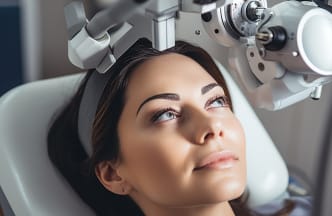No Widget Added
Please add some widget in Offcanvs Sidebar
Shopping cart
- Phone:+91-99116 16919
- Email:info@globalhealthtrip.com
Please add some widget in Offcanvs Sidebar
Shahin Bagh, Abul Fazal II, Jamia Nagar, Okhla, New Delhi 110025

According to the medical dictionary, Ophthalmology is that branch of medicine in which diagnosis, treatment, and prevention of the eye and vision disorders could be provided. Therefore, they are medical doctors who specialize in eye care. They were trained to treat a wide range of conditions, including common vision problems, such as nearsightedness and farsightedness, as well as the more serious issues: cataracts, glaucoma, retinal diseases, and macular degeneration. This field plays a very critical role in maintaining good eye health and addressing any kind of visual impairment that might negatively impact one’s quality of life.
An ophthalmologist performs several tests for diagnosis, including visual acuity examinations, slit-lamp examinations, and other retinal imaging techniques in order to detect and treat the condition. He corrects refractive errors with the use of corrective lenses, and medical treatment may include eye drops for glaucoma or injections for macular degeneration. Ophthalmologists can also be trained surgeons performing a complex operation such as cataract removal, LASIK surgery, and corneal transplant.
Regular check-ups on the eyes cannot be over-emphasized, particularly as problems affecting vision evolve stealthily. Early diagnosis and treatment of eye conditions can help prevent damage or loss of vision in the long run. Ophthalmology continues advancing with cutting-edge technology with treatments being more precise, less invasive, and effective in preserving one’s vision and eye health.
Historical Background The history of dental practice goes back as far as thousands of years, when the earliest forms of dental practice, using crude implements and practices, were undertaken to preserve oral health. For example, it has been believed that the ancient Egyptians used a kind of toothpaste made from ground pumice stone and wine vinegar to clean their teeth. In fact, excavations have uncovered the use of procedures for the extraction of teeth and primitive prosthetics dating back to 7000 BC.
Ancient Greeks were the first to detail the treatment of tooth decay and other oral health issues, while the Roman developed dental care that allowed them to learn manufacturing dental instruments and oral hygiene. A Chinese history dates the practice of using dental fillings since ancient times when in the 7th century they documented it using a mixture of silver and mercury.
The modern age of dentistry began during the 18th century through contributions from various sources, most notable of which was the French surgeon Pierre Fauchard, often referred to as the “father of modern dentistry.” Fauchard brought new techniques and instruments for treating the teeth and gums and laid the foundation for modern dental practices. In the 19th century, anesthesia was available for dental procedures and dental schools became established, which furthered the profession.
Today, dental care is a highly advanced branch of medicine with technologically advanced appliances like X-rays, lasers, and digital imaging, which help in more accurate and minimally invasive diagnosis and treatment.
Ophthalmology treats an array of conditions and does so through various treatment plans. Refractive errors, for example, myopia, hyperopia, and astigmatism can easily be corrected using corrective lenses or LASIK eye surgery. Most eye infections and inflammations are treated by medicated eye drops or even oral drugs. Some of the severe cases, such as glaucoma, can be treated by reducing intraocular pressure with drops, laser treatments, or surgery to avoid a decline in vision.
Usually, cataracts are treated surgically: the cloudy lens is removed and replaced with an artificial intraocular lens. While retinal diseases-for instance, diabetic retinopathy or macular degeneration-can often be managed with laser therapy, injections, or surgery to put an end to further deterioration, many pediatric ophthalmologists undergo specialized training to focus on eye problems unique to children, neuro-ophthalmologic concerns, and cases related to trauma.

Treatment for Ophthalmology Techniques: The preservation and restoration of vision using advanced care for various conditions and visual impairments.
Retinal laser treatment
Our expert ophthalmology care with cutting edge technology will protect your vision and long-term eye health.
Our comprehensive ophthalmology package has the best eye health maintained with prevention, diagnosis, and treatment tailored to each patient.
While availing ophthalmology medical tourism, patients benefit from advanced ocular care with costs of that destination, the most popular medical tourism destinations across the globe. More often than not, patients travel out-of-country for something like cataract surgery or LASIK or retinal treatments as these are pricier compared to what one pays within their home country. India has turned out to be a destination for ophthalmology medical tourism because of skilled ophthalmologists, much latest technology, and internationally accredited eye hospitals. Ophthalmology medical tourism, combining high-class medical services with the opportunity to learn a new culture, is very affordable for those who want specialized eye treatments.
While availing ophthalmology medical tourism, patients benefit from advanced ocular care with costs of that destination, the most popular medical tourism destinations across the globe. More often than not, patients travel out-of-country for something like cataract surgery or LASIK or retinal treatments as these are pricier compared to what one pays within their home country. India has turned out to be a destination for ophthalmology medical tourism because of skilled ophthalmologists, much latest technology, and internationally accredited eye hospitals. Ophthalmology medical tourism, combining high-class medical services with the opportunity to learn a new culture, is very affordable for those who want specialized eye treatments.
We aim at providing the best eye care solutions to keep you seeing well and look forward to a bright future.
The best candidates for LASIK surgery are usually those between 18 and 40 years of age when vision is stabilized.
Cataracts cannot be reversed without surgery; however, early symptoms can be managed using stronger prescription glasses before surgery.
Welcome to Global Health Trip
Typically replies within minutes
Any questions related to Health?
WhatsApp Us
🟢 Online | Privacy policy
WhatsApp us